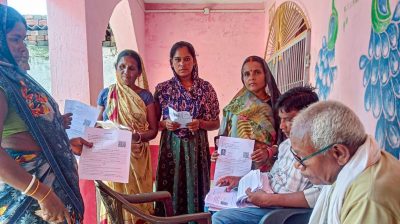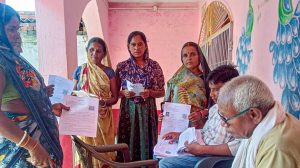Delhi High Court transfers batch of pleas seeking legalisation of same-sex marriage to Supreme Court
The Supreme Court on January 6 transferred to itself petitions pending before various high courts seeking legal sanctity for same-sex marriages.
 "This court is of the opinion that in light of the order of the Supreme Court, all the matters are transferred to the Supreme Court. Office is directed to transfer the record immediately," the bench ordered. (Source: Getty Images, representational)
"This court is of the opinion that in light of the order of the Supreme Court, all the matters are transferred to the Supreme Court. Office is directed to transfer the record immediately," the bench ordered. (Source: Getty Images, representational) The Delhi High Court Monday transferred a batch of eight pleas seeking legal sanctity for same-sex marriage to the Supreme Court.
When the batch was called before a division bench of Chief Justice Satish Chandra Sharma and Justice Subramonium Prasad, the bench was informed that the Supreme Court on January 6 transferred to itself petitions pending before various high courts seeking legal sanctity for same-sex marriages.
“This court is of the opinion that in light of the order of the Supreme Court, all the matters are transferred to the Supreme Court. Office is directed to transfer the record immediately,” the bench ordered.
In one of the pleas, Dr Kavita Arora, a psychiatrist, and Ankita Khanna, a therapist, sought enforcement of the fundamental right to choice of partner, after their application for solemnisation of marriage under the Special Marriage Act was rejected by a marriage officer in Delhi on the ground that they are a same-sex couple.
The second plea was filed by Parag Vijay Mehta, an Overseas Citizen of India (OCI) card holder, and Vaibhav Jain, an Indian citizen, who got married in Washington DC in 2017 and whose application for registration of marriage under the Foreign Marriage Act was rejected by the Consulate General of India at New York.
The third plea, for recognition of same-sex marriages under the Hindu Marriage Act, was filed by defence analyst Abhijit Iyer-Mitra and three others. Thereafter, a lawyer working with a leading international law firm in the US, an artificial intelligence scientist in California, an economics consultant and a business development manager also approached the high court seeking “non-discriminatory access” to the Special Marriage Act for LGBTQ+ individuals.
Opposing the pleas, the Centre had earlier argued that marriage in India necessarily depends upon “age-old customs, rituals, practices, cultural ethos and societal values”, and that in reading down the provision of Section 377 of the IPC covering homosexuality, the Supreme Court had only decriminalised “a particular human behaviour” but “neither intended to, nor did in fact, legitimise the human conduct in question”.
On January 6, a bench of Chief Justice of India D Y Chandrachud and Justices P S Narasimha and J B Pardiwala, allowed the request to transfer the petitions and also permitted the petitioners to appear virtually before it. The matters are listed before the Supreme Court on March 13.
“As writ petitions are pending before Delhi, Kerala and Gujarat High Courts involving the same question, we are of the view that they should be transferred and decided by this court. We direct that all writ petitions shall stand transferred to this court,” the Supreme Court order said.
The apex court seized a batch of pleas in the matter, including one by a 46-year-old Indian national, who said he married a US citizen in September 2010 in the US and registered their marriage in Pennsylvania in June 2014.
He and his partner, residents of Pune, said their attempts to get their marriage registered under the Hindu Marriage Act, 1955, came to nought as the Registrar of Marriages refused to grant their request. They said they subsequently wrote to the Indian embassy in Washington DC, seeking to register the marriage under Foreign Marriage Act, 1969, but that request was also turned down.
Among other petitions are those filed by one Supriyo Chakraborty and Abhay Dang and Parth Phiroze Mehrotra and Uday Raj Anand, seeking recognition of same-sex marriage under the Special Marriage Act, 1954.







